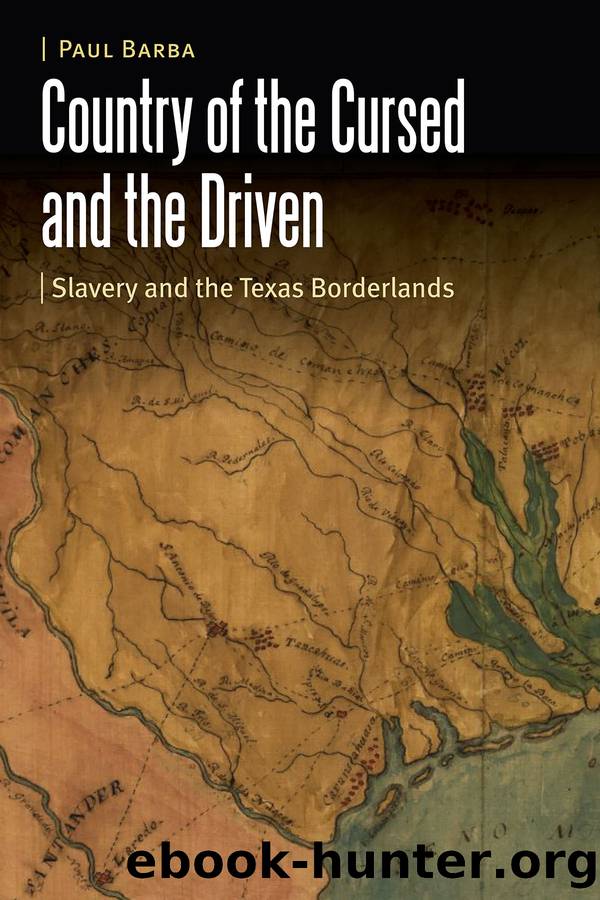Country of the Cursed and the Driven: Slavery and the Texas Borderlands by Paul Barba

Author:Paul Barba
Language: eng
Format: epub
Publisher: Nebraska
Published: 2021-05-15T00:00:00+00:00
Texians pinned the fortunes and future of their cotton-based paradise to the ever-growing transplantation of Anglo colonists. As Governor Bell explained in his message to the Texas state legislature in 1853, âThe past year has been distinguished by an unusual yield of the agricultural products of the State; and the superabundant returns of the husbandman find a ready demand in the tide of immigration now swelling to an unexampled extent. With few exceptions, general health has been enjoyed by the citizens of every section.â Others concurred. âAgain, we want population,â declared Congressman Pendleton Murrah in 1857. âWe want more of our rich lands in cultivation; and every inducement, however slight it may be, ought to be held out to emigrants.â46 In general, the economic benefits were quite extensive for the Anglo colonial project, as movement itself propped up Anglo development. The gateway towns of Natchitoches, Shreveport, and Fulton grew as colonists funneled their way into Texas through the Gulf of Mexico and the Red River. With overland travel growing, especially along the northeast trails, portions of Texas were increasingly dotted with impromptu campsites, travelers inns, and urban hotels. Port towns and way stations like Galveston and Houston benefited economically from the flow of people who traveled by river and by sea, with local establishments charging fees for all sorts of services, including lodging, boarding, wagon repair, horse stabling, and resupplying. For instance, the cost of travel to Montgomery County, Texas, for two Alabama families, numbering fifteen people, with fifty enslaved African Americans and various draft animals, was about $120; with tens of thousands of people making their way to Texas, the accumulated value of such expenses meant Anglo-American locals reaped significant profits. Texian commentators thus had reason to laud âthe tide of immigration.â47
But even as Anglo-American newcomers received the credit for growing the economy and for developing the built environment of Texas, enslaved Black people were the primary engines of economic change, the major suppliers of colonial labor. The midcentury reality that Texian writers would often skirt (or treat euphemistically) was the fact that wherever Anglo-Americans went, enslaved people toiled. The sugarcane fields that dotted the eastern and Gulf portions of Texas, for instance, were made profitable only by slave labor. There African Americans did everything: they prepared the land, planted the stems, gathered and rolled the cane, and boiled the sugar until crystallization. They also took care of the many cornfields that sustained the growing population of Anglo-Texas, and still others labored as domestic servants for the rich and the (relatively) poor.48 And when slaveholders had surplus slaves or were in need of a quick influx of cash, they hired out their slaves for all sorts of purposes. Hired-out enslaved people worked as cultivators, pickers, builders, mechanics, cooks, carpenters, and in-home servants. Their presence was widespread, evidence of âslaveryâs flexibility and functional utilityâ in Texas.49
As further evidence of that flexibility, Anglo-Americans also forced enslaved Black people to care for their herds of animals, especially on the vast grasslands of the region.
Download
This site does not store any files on its server. We only index and link to content provided by other sites. Please contact the content providers to delete copyright contents if any and email us, we'll remove relevant links or contents immediately.
| Canada | Caribbean & West Indies |
| Central America | Greenland |
| Mexico | Native American |
| South America | United States |
Cat's cradle by Kurt Vonnegut(15339)
Pimp by Iceberg Slim(14489)
4 3 2 1: A Novel by Paul Auster(12377)
Underground: A Human History of the Worlds Beneath Our Feet by Will Hunt(12090)
The Radium Girls by Kate Moore(12019)
Wiseguy by Nicholas Pileggi(5771)
The Fire Next Time by James Baldwin(5432)
Perfect Rhythm by Jae(5398)
American History Stories, Volume III (Yesterday's Classics) by Pratt Mara L(5301)
Paper Towns by Green John(5180)
Pale Blue Dot by Carl Sagan(4996)
A Higher Loyalty: Truth, Lies, and Leadership by James Comey(4954)
The Mayflower and the Pilgrims' New World by Nathaniel Philbrick(4495)
The Doomsday Machine by Daniel Ellsberg(4485)
Killers of the Flower Moon: The Osage Murders and the Birth of the FBI by David Grann(4443)
The Sympathizer by Viet Thanh Nguyen(4385)
Too Much and Not the Mood by Durga Chew-Bose(4338)
The Borden Murders by Sarah Miller(4314)
Sticky Fingers by Joe Hagan(4188)
